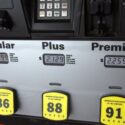
Although there is a great deal of information available to consumers about their vehicles, there is also a bunch of misinformation . What are some current car care myths?
Oil Changes Prevalence
For the longest time, people assumed you had to change the oil every 3,000 miles. And for a long time, that was true. But today? Engines are different– more efficient. These days it’s more like oil changes are due every 7,500 to 10,000 miles. You can check your owner’s manual for specifics.
The Tire Pressure “Eye Test”
How about the idea that you can tell how your tire pressure is doing just by looking? Myth! You really need to use a tire gauge to check the pressure, and it’s also a good idea to inflate regularly because tires do tend to lose some pressure over time. It’s best to check tire pressure once a month, in the morning when the tires are cold and the vehicle has been out of the sun. Keep in mind there’s “maximum pressure,” which isn’t the same as the ideal pressure. Typically, the ideal pressure is printed on a sticker on the driver’s door jamb or inside the fuel-filler door.
Dirty Air Filters
Do you think that replacing a dirty air filter improves efficiency? Maybe in the old days (1980s and before) but today’s more modern vehicles are typically fuel-injected and have computer-controlled gas engines instead of ones with carburetors.
“Warming Up” The Car
Here’s a good one, especially for our area: “The car needs to ‘warm up’ before I drive it.” Wrong! Again, maybe in the old days, but today’s vehicles have modern engines that warm up a lot quicker when they’re in use. Therefore, you can just start your engine and go, even on a cold winter’s day in PA.
The Meaning Behind the Check Engine Light
How many of us want to “just ignore the check engine light?” It’s a myth that the light means nothing. If that light is on, something needs to be checked, and, most likely, fixed. It could be something simple or complex, but you won’t know until you take it to a professional who can run a diagnostic test to determine what’s up.
Premium Gas
When you go to get gas, do you assume that higher-grade gas must be better? Myth. Most vehicles are designed to run on regular-grade 87 octane gas. The higher grades are meant for certain vehicles and engines that may need that kind of fuel, especially to cut down on engine knocking or pinging.
Routine Maintenance
Finally, there’s a myth that special service is required to “winterize” or “summer-ize” your vehicle. The reality is you don’t need any special seasonal service; just keep up with scheduled maintenance and you’ll be fine
If you’re looking for quality used cars in the Leighton, PA area, check out the inventory at 443 Auto Sales.
